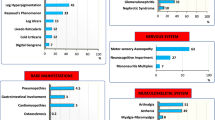Abstract
HCV infection may be related to many extrahepatic manifestations including mixed cryoglobulinemia (MC). Clinical manifestations commonly associated to MC include arthralgia, purpura, vasculitis, peripheral neuropathy and renal function abnormalities. Treatment with interferon often leads to remission, especially in virological responders, or to disappearance of MC-related clinical manifestations. We report on a patient with chronic hepatitis C, deficit of G6P-DH, type II MC, who developed a cryoglobulinemic vasculitis with purpura, renal impairment and arterial hypertension, during treatment with PEG-interferon a-2b plus amantadine. The occurrence of purpuric lesions and MC-related nephropathy with increased cryocrit despite negative viremia, in a patient previously asymptomatic, during interferon treatment, is unusual.
Similar content being viewed by others
Author information
Authors and Affiliations
Corresponding author
Rights and permissions
About this article
Cite this article
De Blasi, T., Aguilar Marucco, D., Cariti, G. et al. Cryoglobulinemia-Related Vasculitis During Effective Anti-HCV Treatment with PEG-Interferon alfa-2b. Infection 36, 285–287 (2008). https://doi.org/10.1007/s15010-007-6299-1
Received:
Accepted:
Published:
Issue Date:
DOI: https://doi.org/10.1007/s15010-007-6299-1




